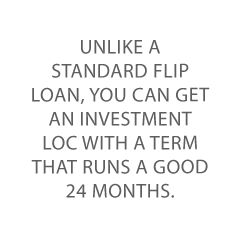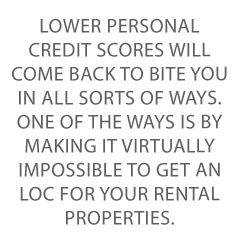Are you looking for an investment property line of credit? And are you wondering if it’s good to get one, or where to get one?
Get the details right here on financing for any sort of real estate investment, from a fix ‘n flip to a shopping mall to luxury condos.
What Is An Investment Property Line of Credit?
An investment property credit line is a type of short-term financing. It uses the home equity in a nonowner-occupied property to provide ongoing access to funds via revolving credit.
You draw a certain amount of funding, use it, and then pay it back. And then you can reuse it. Because draw amounts can change, the amount of money you are paying back is variable. Contrast this with a loan or mortgage, which often has a fixed rate.
Often, this type of rental property financing has variable rates. So, as the prime rate and other rates go up, you may find you are paying higher rates.
Also, a lender will place a lien on an investment property in exchange for a revolving line of credit against the property. It operates the same as a home equity line of credit (HELOC).
Lines of credit will often have a draw period during which you can borrow money. You will likely still make monthly payments during the draw period, but they may be interest-only payments.
Once the draw period ends, your remaining balance is amortized over a set repayment term and you’ll make monthly payments until the loan is repaid.
Note: there are short-term lines of credit that immediately amortize and require full payments immediately, though. So, make sure you understand the terms.
Investment Property Line of Credit Types
Type 1 – Investment Properties Lines of Credit
There are a few different types of these LOCs. A single is just an LOC used on one property you’re using for investment purposes. Often these are for lower amounts (understandably) with payback periods of something like ten years.
Portfolio (more on this type below) is a better loan to value (LTV) of maybe 75% versus a single. Amounts are higher, usually starting at $1 million. The loan term is only a few years. These are for people with a lot of properties who are turning them over quickly.
For house flip funding, there is also a more generalized business LOC. If you have an established business, you may be able to get a business line of credit using your company’s credit history.
In some cases, you may have to put up collateral for a business LOC, but some lenders offer unsecured LOCs with no collateral requirements. This is helpful, so you can hold onto, say, your home equity.
Type 2 – Home Equity Loan (an Alternative)
Some entrepreneurs will go with home equity loans to finance an investment property. But recognize what you are getting yourself into with a home equity loan. An investment property HELOC will work much like any other HELOC.
That is, it is a second mortgage on what is likely to be your primary residence. No doubt your mortgage loan officer would love for you to get one. However, as every interest rate is rising (along with its commensurate annual percentage rate), so are mortgage rates.
Any HELOC lender will charge you the highest mortgage rates that they legally can (although this is true of any lender). So, home equity rates could be rather high.
There will also be closing costs like with your primary home loan. Because rates are only going up, expect to pay higher mortgage rates for this second loan.
If you don’t have a lot of home equity in your house, this type of loan is unlikely to be worth the costs. But if you are close to retirement, you may want to consider a reverse mortgage.
However, the idea behind those is to give you money to live on, and not use them for real estate investment loans.
Type 3 – Hard Money Loan (an Alternative)
This type of investment loan is also called a bridge loan.
If you have a bad credit score, then a line of credit for an investment property may be out of reach. But a hard money loan would not be. Using the property as collateral, a hard money lender will generally look past a low credit score.
In general, hard money lending is for a rental property. There can be laws against a lender offering it for your primary residence. As a result, if you live at the same address as the rental property, you may be out of luck. But check local laws to be sure.
At least it’s not personal lending, so it won’t show up on your credit report. But it will show up on any background check or asset search.
Still, if your credit is poor, it can be one of the only ways to get a rental property loan.
Type 4 – Business Credit Card or Cards (an Alternative)
Business credit cards can be a great way to cover realty investment expenses. Fix ‘n flip situations will require everything from paint to plumbing fixtures.
Corporate credit cards can not only cover these expenditures—they can also help a business owner build business credit.
Using a credit card may seem like an odd idea for house flipper financing. But don’t think of it as you, the real estate investor, simply putting a building on a credit card.
Rather, the idea is to use a credit card to purchase all the incidentals that you need for updating, fixing, and selling a property.
Consider this: if you were looking to sell your primary residence, you would likely pay for shrubs to increase curb appeal, or paint and plaster to fix cosmetic blemishes. You may also pay to update an electrical panel or get a new oil tank.
If you’re considering using plastic to pay for any of these things anyway, then a company credit card is a smart choice so you build business credit at the same time.
Type 5 – Portfolio Line of Credit
For an entrepreneur with more than one investment property, a portfolio LOC could be the best option. Essentially, you are using preexisting assets as collateral to pay for more assets. In this case, real estate.
A portfolio loan or LOC is secured by an investment that serves as the collateral. As an individual you may use investment accounts to qualify. As a real estate investor, you may use your part or all of your real estate portfolio to qualify.
Loan requirements are somewhat similar to those for an investment property LOC. Still, you may need a higher credit score and more cash in reserves to qualify for a portfolio LOC. Often, you’ll also be borrowing more money this way than with an investment property LOC.
Because of this, rates tend to be somewhat higher.
However, you do not have to get a portfolio LOC just because you have multiple properties. It really just depends on the loan amount needed and your qualifications.
Pros
Pro 1 – You Don’t Pay Interest on the Entire Amount
Like other lines of credit, you only pay on the amount that you borrow. This is a far easier to take arrangement than a conventional loan from a credit union or bank, where you are paying on the entire loan amount.
Instead, the borrower draws a particular amount of money and then pays interest on the drawn amount until it is paid off in full, via an automatic payment. And, once it is, those cash reserves are available to be borrowed again. A standard loan does not work this way at all.
Pro 2 – Longer Payback Time
 Unlike a standard flip loan, you can get an investment LOC with a term that runs a good 24 months. Some even have mo
Unlike a standard flip loan, you can get an investment LOC with a term that runs a good 24 months. Some even have mo
rtgage-style payback terms of thirty years! That’s longer than most investment property loans.
This can make them particularly good if you live in the property you are using for rentals. Essentially, they can be a lot like a mortgage, but with an easier interest payment rate.
But check, as there are places where you cannot use an investment LOC on your own residence.
Pro 3 – Relatively Low Rates
Want to pay less in rates? Then an LOC is right up your alley. And, because you’re only paying rates on a fraction of the amount anyway, this can make them more attractive than business loans or a personal loan when it comes to rates you’ll pay.
If you get your LOC via online banking, you may also see a rate reduction. And that, of course, will come with all the benefits that go along with banking online. Also, many of these lenders are an equal housing lender.
Pro 4 – Get a Tax Break on Interest Paid
As you pay off a mortgage and earn more home equity in a property, you may see your mortgage tax break diminishing. But with an investment LOC, you will get a break on all of the interest paid, even as you reuse the line over and over again.
But that is not the case with mortgages or investment property loans. With those types of lending, any tax break will go down as you pay down the balance. And if you pay down your principal, your tax break will disappear even more quickly.
Cons
Con 1 – The Amount You Pay Interest On Varies
Unlike with investment property loans, an LOC comes with variations. Your monthly payment will not be predictable. As a result, that can make it difficult to budget too far in advance.
Since you will most likely need more when times are harder (say, rental income is late, for example), then you are raising your payments just when you need cash the most.
Therefore, an LOC requires some planning and personal flexibility, which may seem like a contradiction in terms. Essentially, you will have to think ahead but also be ready to roll with the punches.
Con 2 – You Will Always be Paying Interest on Any Draws Until They are Paid Off
The draw period can be daily or weekly. If you are waiting for a payment for this or that, you will still have to pay. Contrast this with an investment property loan, where you may be paying on a monthly basis.
Not having to pay more than once per month can allow you to wait on lawyer schedules for closings, and for buyers to make their decisions. With an LOC, you might just be a bit desperate for payments. And that’s a negative if you’re trying to negotiate a sales price.
Con 3 – You’ll Need a High FICO Score for Credit Approval

Lower personal credit scores will come back to bite you in all sorts of ways. One of the ways is by making it virtually impossible to get an LOC for your rental properties.
This often drives a business owner to hard money lending. Or, a business owner might pull from their own savings account or checking account, or take out a personal loan from a credit union or bank if they can. None of these are a good idea in the long run.
This is another reminder that fixing your personal credit scores is always a good idea.
Con 4 – Restrictions on the Use of the Money
With a home equity loan, you may see this, and you will certainly see it with an investment LOC.
You may end up not being allowed to invest the money directly into your business. Rather, you would have to do so indirectly, by fixing up a property so you can flip it and sell it for more than you paid for it.
If having to do a workaround doesn’t bother you, then this truly isn’t a con. But it does add an unwelcome layer of complexity to your business financing all the same.
How to Apply For An Investment Line of Credit?
Just like with any kind of business, your first step will be to gather documentation. In this way, you are prepared to demonstrate information about your qualifications. This includes:
- What is the property’s value?
- What type of property is it? For example, is it single family or multi family?
- How much home equity do you have in your property?
- How long have you owned this particular property?
- What are its lease agreement terms?
- Exactly how do you plan to use the money that you borrow?
- What is the legal structure of the business which owns the property? LLC, corporation, something else?
- What are your credit scores (business and possibly personal)?
- Just how much do you have in cash reserves?
You may need to document these factors with business bank account statements. Add in your LLC operating agreement (if applicable). Also, some lenders may require tax returns. These can be personal or business returns.
Then, you will have to locate a lender that offers investment LOCs. It may be possible to get funding through a financial institution like a credit union. However, don’t be shocked if those financial institutions do not make these types of loans. Some do not.
It might also make sense to search for financing via a loan broker, mobile banking, or an online lending marketplace.
Takeaways
Due to the potential for a high return on investment, rental realty is expensive. Fortunately, there is funding available out there.
At Credit Suite, we can help you attain Fundability™ so you can qualify for more and better types of financing, for rental realty and more. Contact us today to learn more about how we can help you take your flipping business to the next level.

